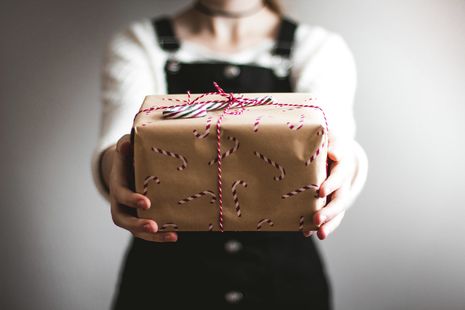The Curious Politics Behind Gift-Giving
Scarlet Rowe reflects on the expectations tied up in the act of gift-giving.

It’s beginning to look a lot like Christmas, or in Cambridge at least, where Christmas always arrives at least one month early. Not that I’m complaining. It’s the most wonderful time of the year, afterall. (Can you read that in a non-singing voice? I can’t).
I quite vividly remember last Michaelmas when I had the supervision “that spoils Christmas.” In other words, the one on gift exchange. Before you give up on this article completely, you’re probably itching to already; please hear me out – it may well be worth it!
“Can a gift then be truly free, if it has a contingency or expectation?”
Anthropologists spend a lot of time, probably too much time, looking at gift exchange. They’re fascinated by the notion of a “pure gift”, and whether or not it actually exists in practice. This mostly centres around the question: do we ever give something with no expectation of return? A lot of this depends on how we define “return”, because for example somebody could give anonymously to charity with no expectation of a material return. However, they might expect to feel quite good about it, and maybe even expect a reward in an afterlife. If I give to a homeless person on the street, I’d probably expect to feel like a better person for it. Can a gift then be truly free, if it has a contingency or expectation?
Take another instance: if I give you something for your birthday, would you simply accept it and not return the favour on my birthday? Probably not. Or, if you didn’t return the favour, you might feel quite guilty about it. Most likely, you’ll get me a present a few months later for my birthday and in the process, renew the gift exchange cycle. If you don’t return it, I may even be so upset that I unfriend you on Facebook. A final example: my friend bought me a coffee last week and so next time we meet, I will buy them one in return. If I forget, I may unintentionally create a layer of tension (which I’d rather avoid). This is generally why anthropologist Mauss said that “there is no such thing as a free gift.” Instead, gifts serve to create and renew social relationships, as they carry a certain moral obligation (even if, on the surface, they appear to be voluntary).
Moreover, as gifts “contain something of the giver,” in that we’d tend to associate a necklace with an aunty, or a book with a cousin for instance; gifts contain a certain spirit. This makes it harder to dispose of them, because we may feel guilty for doing so, in a way that we wouldn’t if we threw away a t-shirt we bought for ourselves. We certainly wouldn’t express disdain at a gift received at Christmas, even if we were secretly disappointed. It’s just not the done thing, because we simply can’t disassociate the gift from the giver. For example, I lost a locket that my mum brought me last year and even though it could be replaced, it was upsetting because it had a sentimental value that re-ordering another online could not replace.
“There is also a ceremonial element to gift giving, which tends to give individuals a real sense of belonging”
There is also a ceremonial element to gift giving, which tends to give individuals a real sense of belonging. For example, if I partake in a group Secret Santa, I’ll probably join friends on an evening to exchange gifts. We might make a special meal for it, or plan some fun activities. Whatever we decide to do, we’ll reinforce our sense of community in the process. For some people, however, the Secret Santa may be a reminder of their obligation to others, even if they feel like an outsider most of the time. This isn’t all bad, as the Secret Santa could (at least momentarily) help to mollify tensions through bringing everyone together in celebration and spreading a little bit of joy. At the same time, the Secret Santa exchange also creates boundaries, because it establishes who is part of the group and who is not. So, the Secret Santa might even become political if someone is left out and feels strongly about it. It may even worsen existing inequalities if I deliberately exclude someone. I promise I wouldn’t, though!
In strong contrast, an exchange of money between Primark and me won’t make (or break) any social relationship or ignite any particularly profound emotions because no relationship really existed in the first place. Maybe this is why we tend to like gift giving; it provides a welcome break from the capitalist mania in which we live, even if it does create a whole new set of problems. Or actually, on second thoughts, maybe it doesn’t provide a welcome break because many of us still seek to accumulate material excess through gift giving. Alas.
This whole article has really been a very rambling attempt at showing how gift exchange is political, economic and cultural all at the same time. I promise I haven’t tried to spoil your Christmas, but if I have, then I refuse to take responsibility for the unfortunate circumstance. Wishing you all a very happy break from the madness of Michaelmas!
 News / CUP announces funding scheme for under-represented academics19 December 2025
News / CUP announces funding scheme for under-represented academics19 December 2025 News / SU reluctantly registers controversial women’s soc18 December 2025
News / SU reluctantly registers controversial women’s soc18 December 2025 News / Cambridge welcomes UK rejoining the Erasmus scheme20 December 2025
News / Cambridge welcomes UK rejoining the Erasmus scheme20 December 2025 Features / Should I stay or should I go? Cambridge students and alumni reflect on how their memories stay with them15 December 2025
Features / Should I stay or should I go? Cambridge students and alumni reflect on how their memories stay with them15 December 2025 Film & TV / Timothée Chalamet and the era-fication of film marketing21 December 2025
Film & TV / Timothée Chalamet and the era-fication of film marketing21 December 2025










